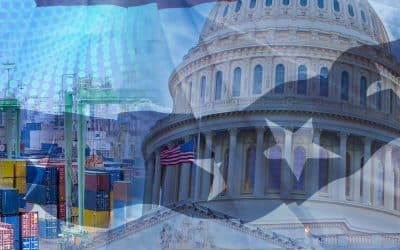Geopolitical tension in Ukraine raises global risks

Redacción Mapfre
Pandemic control, the sovereign power of the major powers, and the energy crisis, among other events, have remained on the main economic agendas. Everything points to the fact that these risks, which have persisted over the past year, will persist through 2022. However, the recent geopolitical conflict in Ukraine has come to the forefront with the United States, supported by NATO, and Russia being the main poles of tension that could affect the future of the economy for the coming months.
The latest ‘Economic and Sector Outlook 2022’ report, prepared by MAPFRE’s Research Department, presents a series of renewed risks in geopolitical matters at a time of wide-ranging complexity and uncertainty “that push the current risk landscape to a higher level.”
Geopolitical crisis and global governance
The challenge between Russia and the United States has highlighted the existing conflict between the two powers over the Ukrainian issue.
The establishment of red lines from Russia regarding Ukraine’s ability to host NATO weaponry faces the risk of less diplomatic resolution and renewed sanctions (such as the shutdown of Nord Stream 2) that “could put increasing pressure on the risk of militarization of the conflict.” In this context, the report stressed that “guarantees of stability through diplomatic channels are being diluted,” which could lead to an eventual two-sided war.
Added to this challenge is the process of reconstruction of American foreign policy under Biden, beset by “the disorderly exit from Afghanistan and the more than frozen relations with China.” In the European framework, the most worrying issue comes not only from the tension in Ukraine, but also from the populist dynamics in Eastern Europe and migratory flows, in addition to “the energy crisis and the worrying current state of the pandemic.”
Global debt
As the global economy recovers and inflation rates persistently rise, “record debt levels are beginning to reflect an improvement in global terms,” albeit with growing divergence between regions.
In the more developed economies, monetary policy has continued to foster an accommodative scenario as the economic recovery has consolidated and fiscal arithmetic repaired fiscal deficits. With deeply negative real interest rates, the result of massive asset purchases and persistently low nominal interest rates, experts point out that the pillars of the recovery for this year “rest on the fragility of much higher debt stocks, against a backdrop of a still deteriorating fiscal position.”
In emerging economies, the risk is more pronounced due to: “a more advanced monetary tightening process, higher inflationary pressures, and the degree of external dependence.” Countries such as Brazil, Argentina, and Turkey have highlighted these vulnerabilities through currency weakness.
Economic policy
As the view of transitory and limited inflation loses steam in the face of more persistent and structurally higher pressures, the monetary reaction will accelerate. Thus, the report argues that monetary policy tightening could “exacerbate fears of unsustainability and a possible return to austerity measures that hamper economic performance.”
In this regard, an aggressive shift in monetary planning by central banks, committed to gradual and properly signaled normalization with the objective of “neither harming the economic recovery nor provoking a situation of fiscal dominance,” is unlikely.
However, the risks of more growth-damaging inflation, the need to gain room to maneuver for futures, and the feedback of the process via wages could intensify price escalation.
Sovereign-financial crisis in China
On the macroeconomic front, China’s outlook continues to deteriorate due to growing energy problems, the direct impact on producer prices, the resurgence of Covid-19 cases, the delicate financial state of real estate developers with Evergrande (under official default rating), and a trend of credit downgrades immersed in a widening process.
In this regard, the People’s Bank of China cut its reserve ratio (RRR) by 50 basis points in mid-December as a measure to facilitate a soft landing of the economy, while trying to tackle the crisis in the real estate sector.
As the dossier notes, anti-tech industry reforms and rising geopolitical tensions could increase the risk of damaging external economic and investor sentiment. “The risk of harmful interventionist policies towards the private sector, coupled with the opaque treatment of offshore defaults around the real estate sector, could damage confidence and deteriorate expectations of a transition to a new model,” it added.
Climate change
The consensus on the risks of climate change was reaffirmed after the COP-26 meeting last October, ratifying its priority at the global level and demonstrating the political will to limit global warming to 1.5 degrees, as well as to achieve the goal of zero net emissions by 2050.
At the same time, confidence in the mainstay of ESG investments strengthened, where sustainable debt doubled in the third quarter of 2021 and could reach $1.5 trillion by the end of 2021, while green bond issuance reached new highs of $140 billion on the same date.
In contrast, the Research Service experts consider that no major issues were addressed “such as the decarbonization of supply chains, which cause a large part of emissions, or global carbon pricing strategies.”
Covid-19
The recent appearance of the new variant (“Omicron”) has been a major challenge to the confidence gained by current vaccines and treatments. The risks of an asymmetric vaccination process, with developed countries inoculating boosters while emerging countries suffer from a strongly depressed first-line process, materialize in the form of a new strain that could either undermine effectiveness or circumvent the current protection offered.
Despite being at a still premature stage of study to understand the consequences of this variant, the risk scenario continues to highlight the danger of continuing with a vaccination process dominated by advanced economies, which is clearly inconsistent with the global purpose of ending the pandemic.



